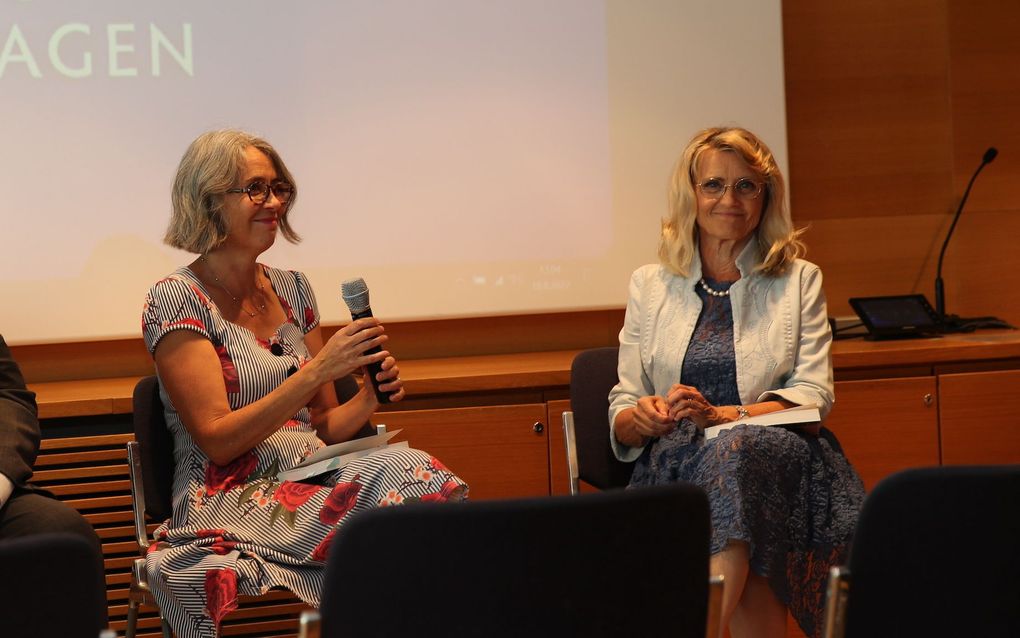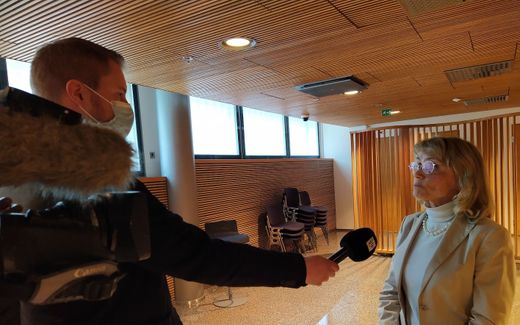Finnish author saw that Räsänen trial causes pain for all parties

Miettinen (left) at the presentation of the book about Räsänen (right). Photo Perussanoma, Petri Vähäsarja
Northern Europe
Pain for all parties. That is the outcome so far of the long-during trial against the Finnish Member of Parliament Päivi Räsänen. “Whoever I met, everyone was in pain”, says Danielle Miettinen.
The author wrote a book about Räsänen’s trial. “Indicted” is the title in Finnish. For this, she spoke to all the key players in the trial of the Christian Democrat MP.
It struck her that nobody was really happy or satisfied. Räsänen was acquitted of the three charges at the end of March, but the prosecutor decided to appeal. It will take until August next year for the case to proceed.
Miettinen: “We are living in a time of transition. Päivi stands for the traditional sound that used to be normal in the church. But the prosecutor thinks she is fighting for a more just world; very sincere on her part, I think. This trial must determine which direction the law will take. The tension in such a trial hurts on all sides.”
Danielle Miettinen is a Finnish Christian journalist. The book’s publisher, Perussanoma, approached her last summer. Previously the publicist had written several titles about the lives of missionaries, about revivals in Finland, and a children’s book about the Lord’s Supper. Because the publisher wanted a book about Räsänen’s life, he approached Miettinen.
“At that time, I prayed to God that I could do something in the Räsänen case. Very few people will put themselves in the media for the dredge that this subject can produce. So, I saw the publisher’s question as an answer to my prayer. But I did not want a book solely about Päivi as a person. That’s why we decided to limit it to the court case. However, I was also aware of the risk. This subject could ruin my reputation as a writer. The media are very unpredictable. But I hope to overcome my fear and self-censorship.”
What was your goal with this book?
“To document the case. I think it is a crucial case. It has something of the signs of the times. Something like that needs to be adequately recorded. And especially from all sides. If it is good, the reader will see what the motives and arguments of all parties are.
For myself, I don’t doubt that I am behind Päivi. But that should not matter for the book. I want all parties to see that their part in this matter has been honestly recorded. That is also why I have submitted almost all the quotes for checking beforehand. It is a sensitive issue, so you have to be careful.”
What sources did you use for your research?
“First of all, all the videos made for a documentary about Räsänen. That team has followed her for years, but the material has never been broadcast. Those many hours of video material were of great value to me.
In addition, I conducted interviews with all the main players. I spoke to Päivi herself for about twenty hours. She is a busy person, so our phone calls were often scheduled at the oddest times. For example, when she was skiing or driving. I also spoke on the phone several times with the prosecutor general, Raija Toiviainen, who is responsible for the trial. At first, she was a little stiff, possibly because of distrust, but when I let her tell her story, she opened up. I find that courageous. I don’t know what I would have done myself.
With pastor Harri Meronen, who initially filed several complaints against Päivi, I could only get in touch via e-mail. Some people in the Pride movement closed themselves off to me completely.”
During the trial, the public prosecutor Anu Mantila spoke. Did you also interview her?
“Very briefly, at the courthouse. Toiviainen is her boss, and she is equally responsible for the indictment. However, it seems that Mantila had always kept the case going, even when it was expected that the police would drop it.
During the hearing, she also made a very passionate impression. If Räsänen said something the officer did not like, she would make a sour face or grab her head with her hands.
Of course, I used what Mantila said during the hearing for my book. Always carefully re-typed from a tape.”

In addition to these sources, Miettinen used media archives and struggled through extensive reports of police interrogations. “Everything Räsänen said there during those many hours was written down.”
Dangerous doctors
In the contacts she had around this book, she noticed that some people who are opposed to Räsänen in this matter do not understand anything about the Christian view. “They do not understand that God’s law also represents God’s love. And with that, they see any rejection of homosexual practice as selfish. People have also told me that people like Päivi –who is also a doctor– are dangerous doctors.”

Even in court, she sometimes did not believe her ears. “According to the prosecutor, Päivi had said that gays were not created by God. You could just taste the inability to understand Räsänen. At times it had a high Kafka level. Of course, that also caused emotion.”
How have the reactions been so far in Finland?
“The book has had a lot of publicity. I have also been on a morning TV show together with Räsänen. Various media have covered the presentation of the book. The tone of that was not too bad for me.”
It is now clear that the case has not been concluded but that an appeal will follow. Will the book get a sequel?
“In the meantime, I am working on another book about missionary history. I will continue to follow the Räsänen case from a distance. I have to protect myself from too many projects. I try not to worry but to pray for what is right for me.”
What is this case about?
The Räsänen case begins in the summer of 2019. From her summer cottage, the Christian member of the Finnish Parliament writes a post on social media about Helsinki Pride, the annual festivities for the acceptance of homosexuality.
It shocks Räsänen that the Finnish Evangelical Lutheran Church is a sponsor of the Pride. In her tweet, she asks the church to what extent this is in line with Romans 1, in which the Apostle Paul condemns homosexuality. How can we be proud of something that is sinful and should lead to shame, she asks. She encloses a picture of the relevant Bible texts.
Shortly afterwards, she learns that the police are investigating her tweet because it would lead to incitement.
Just before Christmas, the MP receives an invitation to a broadcast of a satirical radio show on the question of who Jesus is. It is a live broadcast, and Räsänen decides to go because everything she says about the Gospel will be broadcast directly. Just before the broadcast, she hears that the theme has been broadened to include, among others: What would Jesus have thought of homosexuality? In the interview, Räsänen repeats that all people are sinners and need Jesus’ blood for forgiveness. At the same time, she repeats that homosexual relations are sinful.
Shortly afterwards, she hears that this program, too, will be included in the police investigation.

An appearance in an extensive TV report about her, and her husband is also included in the investigation, but the police drop it.
The police, however, refer back to the booklet “Man and woman He created them”, in which Räsänen wrote about homosexual relationships from a medical point of view in 2004. The brochure was almost forgotten, but due to the police investigation, it quickly appeared on the Internet, including in English.
Päivi finds that words are continually being put in her mouth that she has not said. For example, that homosexual people are not made by God. Or that speaking of sin also means that you consider the sinner inferior.
The court case attracts much attention internationally, both from America and Europe. As a member of parliament and former government minister, she enjoys great fame in Finland and beyond. At all stages of the investigation, Räsänen appears continually in the media.
Related Articles






